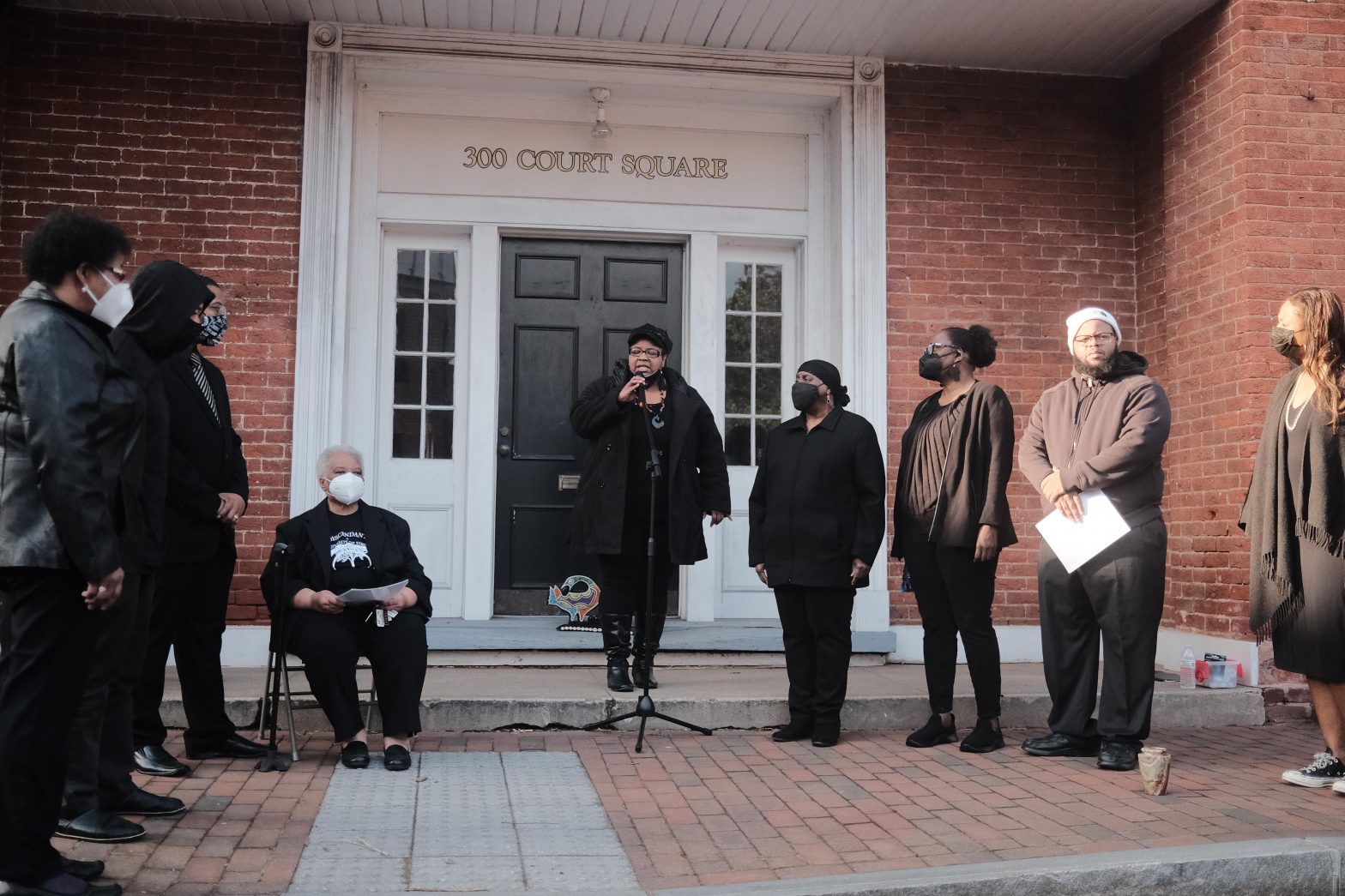‘I’m with you’
Before the United States abolished slavery in 1865, thousands of enslaved people were sold in downtown Charlottesville. The Reclaimed Roots Descendants Alliance—whose ancestors were enslaved at Monticello, the University of Virginia, Highland, and other plantations in the Charlottesville area—held a vigil at Court Square on March 3, the anniversary of the Union cavalry’s arrival in Charlottesville during the Civil War.
“We are here because Black bodies were trafficked. We are here because freedom was taken. We are here because families were separated,” said president Myra Anderson. “It’s a rare opportunity as Black individuals that we can be in a space, holding space for ourselves, our history, our trauma, and our pain.”
After descendant Julia Hubbard sang “Oh Freedom,” descendant Phillip Cobbs read an excerpt from an 1848 narrative written by Henry Watson, graphically detailing his experience being sold at a Richmond auction at the age of 8.
While descendants Courtney Anderson and Joan Burton read the names of enslaved Monticello families who were sold in Court Square in 1829, following Thomas Jefferson’s death, others set down candles around the courthouse steps. After each name, the crowd chanted “Asé,” meaning “I’m with you” in the Yoruba language.
Burton later led a procession across the street, as several others held up a wooden sankofa bird from Ghana. The bird represents reclaiming the past, “so we can move forward and understand why and how we came to be who we are today,” explained Anderson.
Descendant Larycia Hawkins performed a libation ceremony, pouring water from the James River—a major route in the trans-Atlantic slave trade—in front of the sankofa. Others later joined in, watering pots of colorful flowers.
Anderson emphasized the importance of descendants uncovering and sharing their ancestors’ stories, as well as reclaiming the spaces where they were brutalized and dehumanized.
“Everyone has had a say in what goes on in this space except us—the people who are most affected,” said Anderson. “If we talk about moving forward and truly healing, we need to be at the forefront of that.”
Free speech free-for-all
UVA found itself in the national press once again this week, as fourth-year student Emma Camp penned a New York Times op-ed entitled “I Came to College Eager to Debate. I Found Self-Censorship Instead.” Camp writes that UVA’s Grounds is a repressive, uneasy place where “Students of all political persuasions hold back—in class discussions, in friendly conversations, on social media—from saying what we really think.” She writes that after expressing an unpopular opinion in a class discussion, “The room felt tense. I saw people shift in their seats. Someone got angry, and then everyone seemed to get angry.”
New York Times op-ed columnist Jamelle Bouie, a UVA alum and Charlottesville resident, was among the public intellectuals and students who pushed back against the argument. “As political conservatism becomes more unhinged and hostile to democracy, I am sure that it is going to become even more unpopular on campus,” he wrote.
In brief
Seeing green
The Botanical Garden of the Piedmont, a planned public garden on Melbourne Road that has been in the works for a decade, received a record-breaking $1.5 million donation from renowned doctor Carol Angle. The garden has raised $3 million from private donations thus far; the philanthropy efforts mean “we are moving closer to making the garden a reality,” says Carol Carter, president of the project’s board.

Sign of the times?
Mason Pickett’s hobby is standing around Charlottesville holding homemade signs with offensive language directed at Democrats, social justice activists, and the like. (Former city councilor Wes Bellamy was a favorite target.) But last week, Pickett’s cardboard signs read “Putin sucks” and “Stand with Ukraine.” Now that’s evidence of some unprecedented consensus-building.
Holsinger photos on display
In the early 20th century, Rufus Holsinger took portraits of nearly 500 Black Charlottesville-area residents. The Holsinger Portrait Project, an initiative to interpret and publicize the work, plans a full exhibition of the photos in September, and has just opened a pop-up display at the Northside Library as a preview. The portraits “show members of the African American community as they wished to be seen—as people of dignity, beauty, respectability, and strength,” reads a press release from the organizers.
New apartments approved
Charlottesville developers continue to search for opportunities to build new housing in a crowded market. At its Monday meeting, City Council unanimously signed off on a special use permit that will allow a property owner to add six new units to the 21 units that currently sit at 2116 and 2118 Angus Road.
